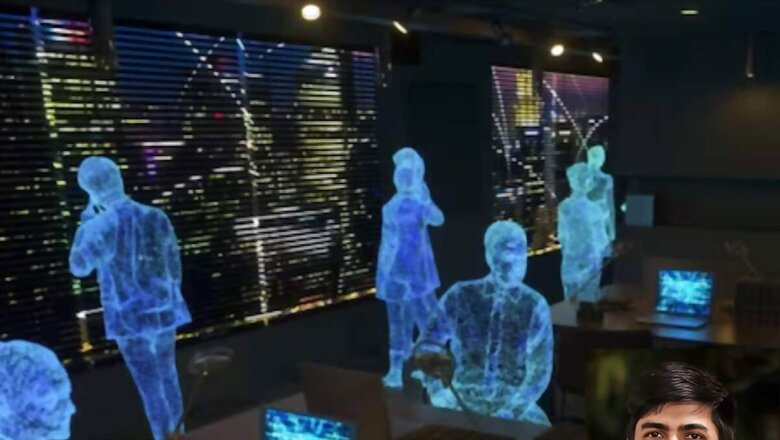
views
Artificial Intelligence (AI) has hit the world like a storm, transforming industries and careers. Imagine a scenario where you are an engineer developing software for warehouse operations. You will see how factory robots are replacing human workers who fear losing their jobs and ask you for your opinion. The harsh truth that you have to tell is that robots will soon replace their jobs and the shift from human to machine automation has already started. What is behind this unstoppable trend? It is AI, the brain of the robots.
There is a similar worry among many people about their job security, and they have a good reason. There are many reports of layoffs and automation by AI tools – a Goldman Sachs report predicts that up to 300 million full-time jobs worldwide could be affected by the new wave of AI that includes platforms like ChatGPT. The main trigger for this recent AI boom is Generative AI, especially large language models (LLMs) that can do tasks based on conversational commands and act like personal helpers, assisting us to write software, compose emails, and summarize texts.
The creative capabilities of multimodal Generative AI models, that deal with multiple modalities such as text, images, and videos, are also fascinating. From on-demand digital art creation to helping an architect with automatically generated 3D floor plan suggestions–the possibilities are endless. This indeed makes it vital to discuss AI and its potential effect on the job market.
Also Read: Success is Automated as a Robotics Professional, Here’s How to Land the High Tech Jobs
AI is affecting different jobs and regions in different ways. While certain jobs are at risk due to the emergence of AI, particularly those that can be automated, others that require critical thinking and management abilities are safe for the time being. For instance, employment in manufacturing, transportation, and customer service are at risk as AI becomes increasingly capable of performing these tasks.
Fields such as law, medicine, and education necessitate human judgment and expertise that cannot be easily replicated by AI tools, although these tools can assist experts in their work. Moreover, the rise of AI will create new jobs in AI development and management. With the increasing integration of AI into our daily lives, there will be a growing need for experts who can develop and manage these systems. In addition, there will also be job opportunities for collaborative work between humans and AI, such as with cobots, or collaborative robots – a type of robot designed to work alongside humans in a shared workspace.
The adoption of AI in various business processes has been accelerating in the past few years, especially after the COVID-19 pandemic. Some business processes that have gone a long way in AI adoption are research and development, customer service, marketing, and advertising. However, many other processes are still in the early stages of adoption, such as human resources, sales, and legal. As AI adoption progresses, it will have a significant impact on the job market, as more and more tasks will be automated or augmented by AI.
Also Read: What it Takes to be Quantitative Analyst? A Guide to Becoming One
AI is a highly sought-after skill in the 21st century, but finding qualified AI talent is challenging. AI professionals need strong foundations in math, programming, and domain expertise. A Forbes article argues that the scarcity of AI talent is a problem of our own making, due to the lack of investment in AI education and training programs. To overcome this challenge, workers and employers need to acquire new skills and competencies that are relevant to the AI era, such as data literacy, digital literacy, programming, critical thinking, and emotional intelligence, as suggested by a Boston Consulting Group report.
Various initiatives have been taken worldwide to impart AI skills to people of different ages and professional backgrounds. These initiatives include creating new curriculums in higher education institutes that focus on data science and AI and offering online resources that enable self-paced and convenient learning of AI. Additionally, working professionals are also taking AI training courses to prepare themselves for AI careers or job transitions.
However, it is also essential to introduce AI education at the elementary or high school level to help students develop an early interest and aptitude for AI and to equip them for the future workforce. In India, the New Education Policy 2020 recognizes the importance of artificial intelligence and integrates AI education at all levels. School children will learn crucial skills such as digital literacy, coding, and computational thinking through contemporary subjects such as Artificial Intelligence and Design Thinking.
The Central Board of Secondary Education (CBSE) has also introduced AI as an optional subject from class 8th with an aim to enhance the multidisciplinary approach in teaching-learning and to sensitize students to explore the new horizons of AI. These efforts and initiatives can help us bridge the gap between the demand and supply of AI talent and create a more inclusive and diverse AI workforce that can harness the potential of AI for the benefit of society.
Written By: Debanga Raj Neog, Assistant Professor, Mehta Family School of Data Science and Artificial Intelligence, Indian Institute of Technology Guwahati


















Comments
0 comment